Welcome to week six, online guide to everything HtTAJwBTG. We will begin with weeks one to five’s presentation notes, and then at the bottom I will provide a link for further study. Hope to see you join us in person next week! Thank you for joining us for week two. We will begin by reviewing last week’s content.
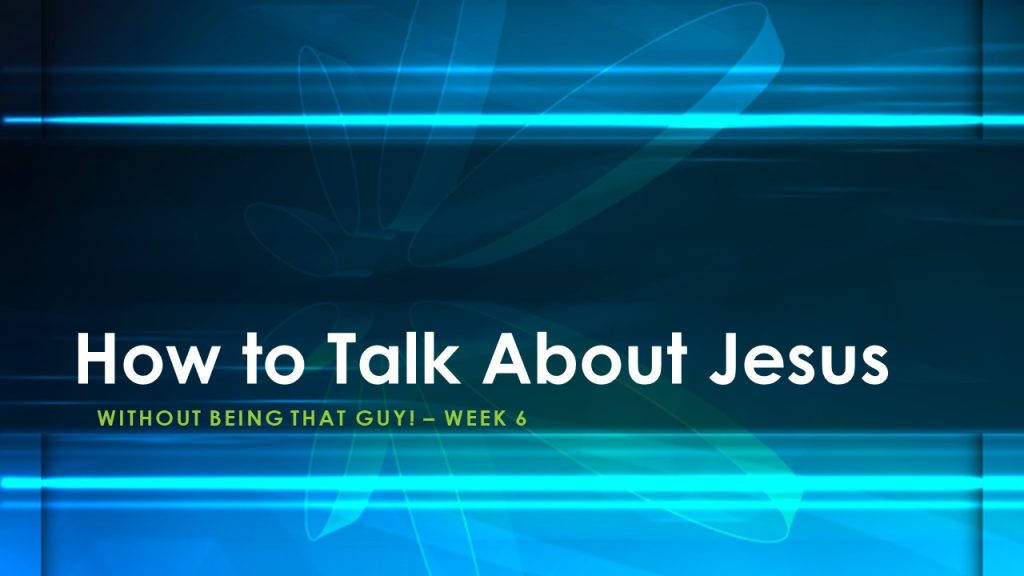
Welcome to our six week review.
Let’s begin by reviewing some summary note from week one – three
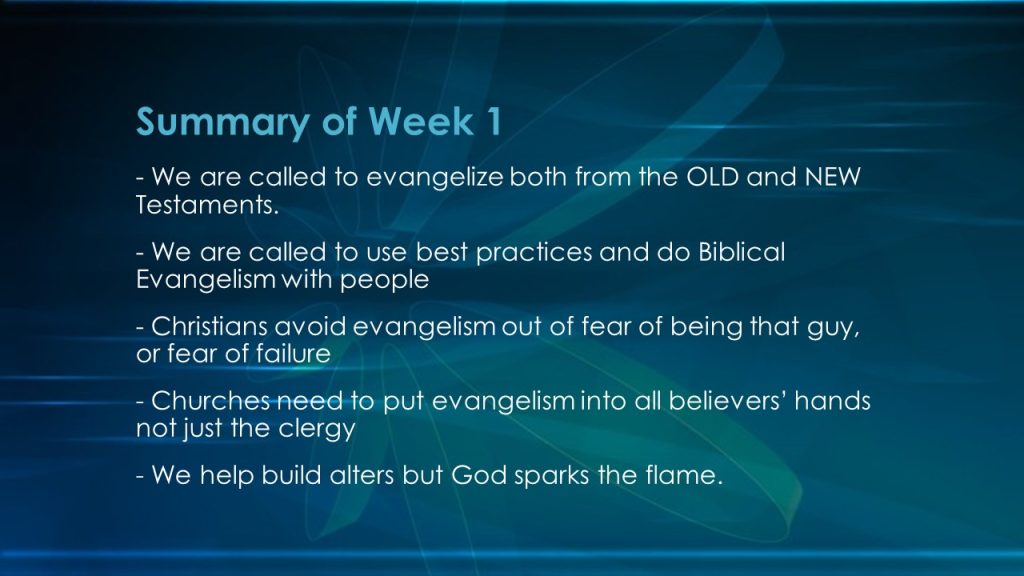
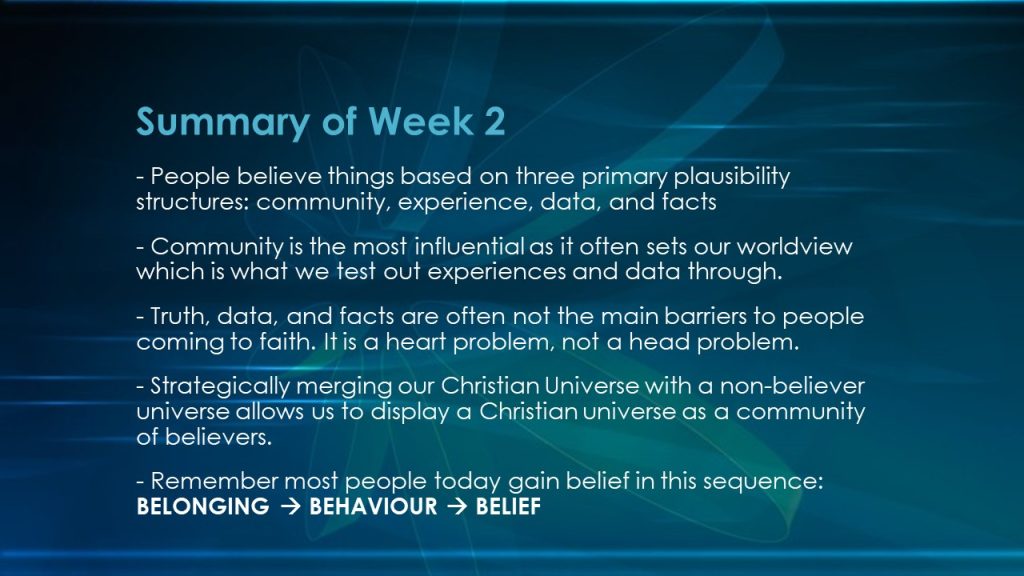
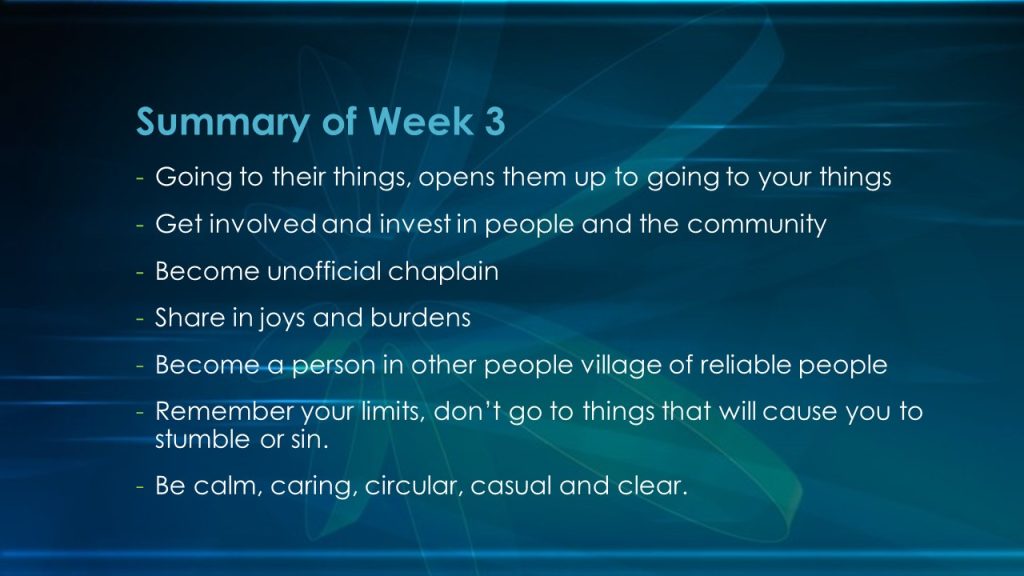
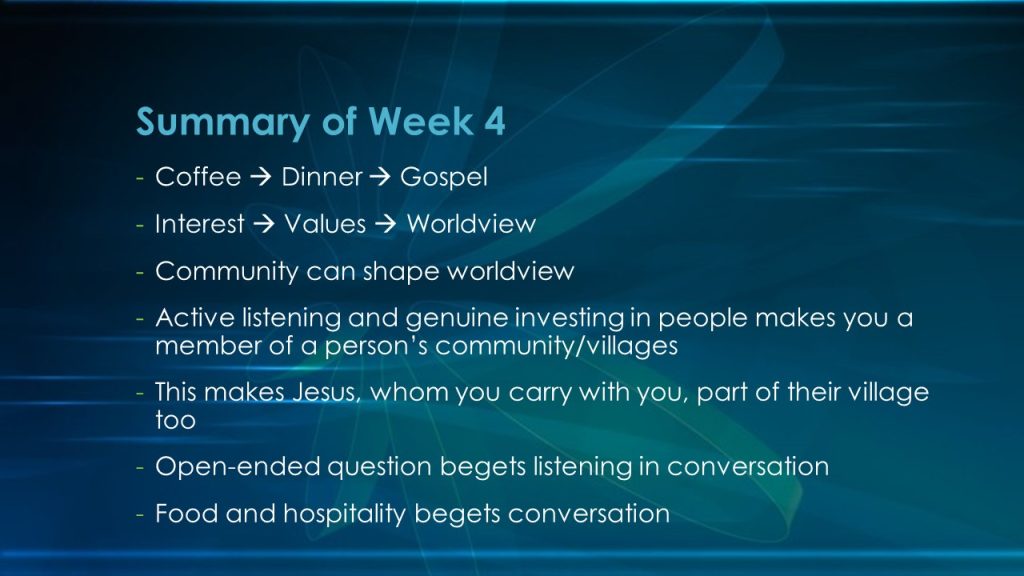
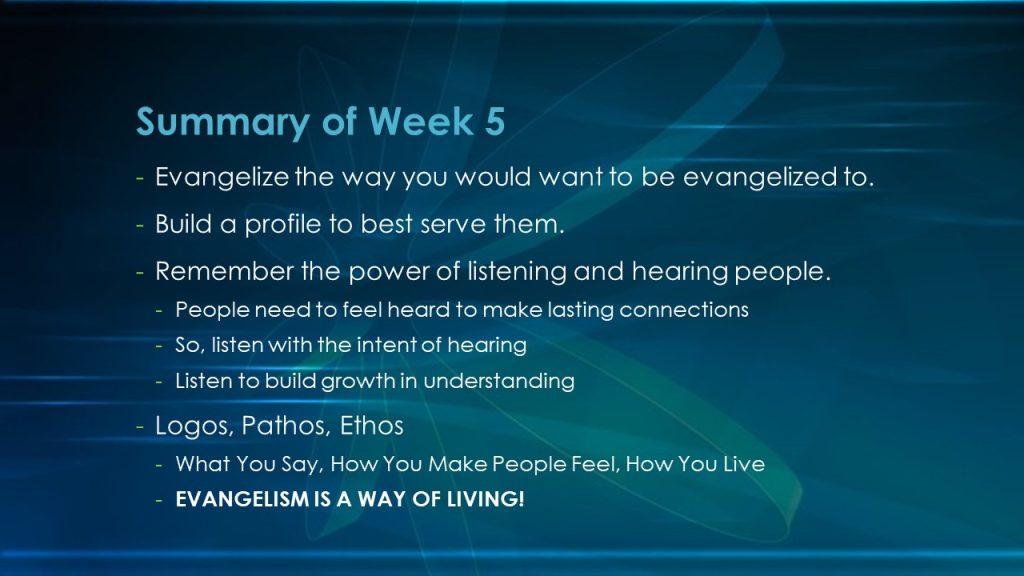
We have covered a lot in five weeks. And now we are shifting from the concept of building up to the point of sharing the Gospel, to actually talking about Jesus with someone. It would be probably be a good idea to return over all the slides to remember all the step which have been taken to get to this point. Remember talking about Jesus doesn’t just rupture out all of the sudden, we would towards it laying out a foundation.
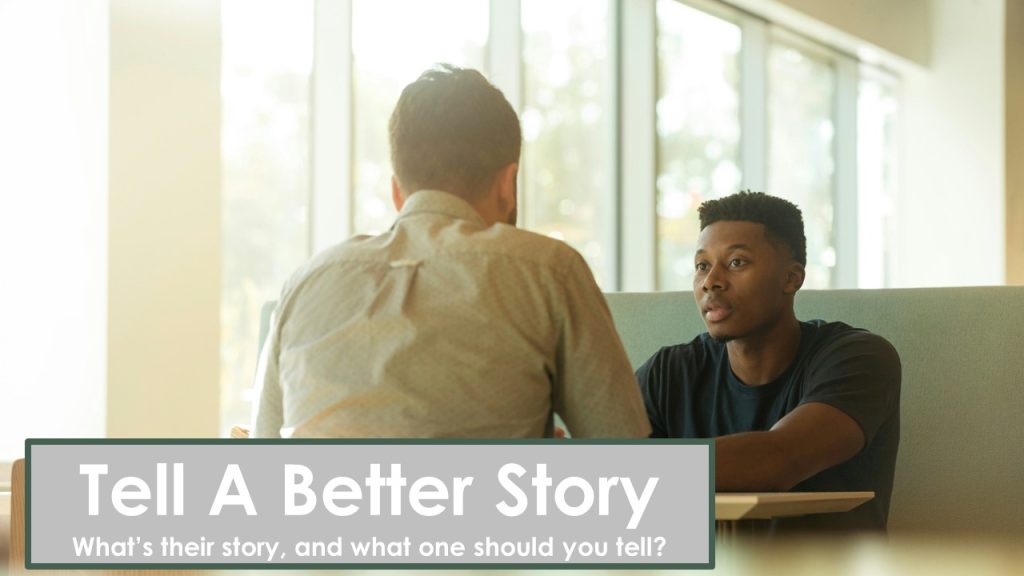
So we have been welcomed to talk about Jesus or our worldview, and we wish to do this well.
This basically means two things: first, we have engaged with the “story” of another person, we have welcomed it, listened to it, asked questions about it, invested it, and second, we have been called to share our story, which includes the story of Jesus as our Savior. How do we do this well?
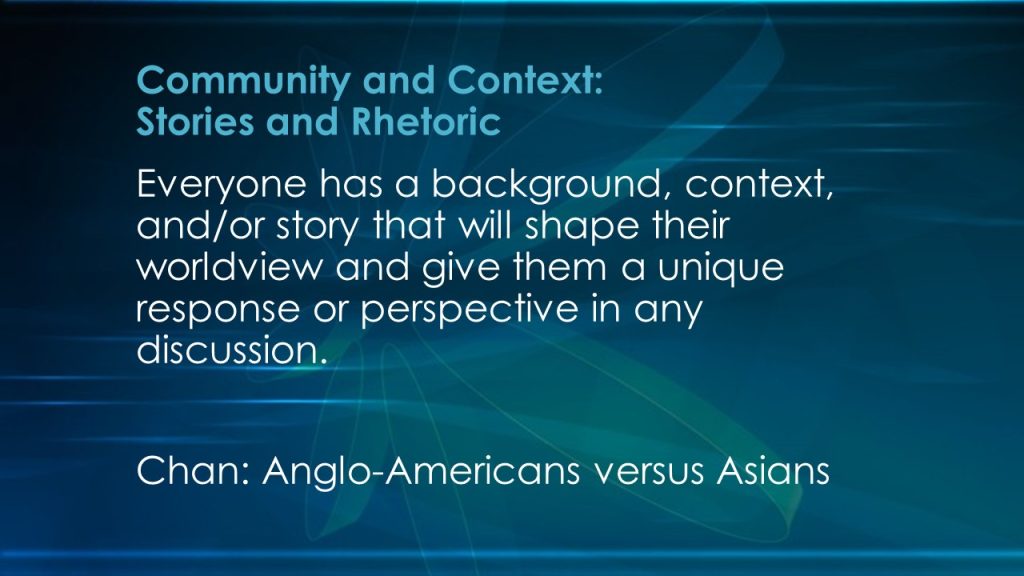
Chan reminds us that this bridging of their story and our story/Jesus’ story needs to be anchored in recognizing the uniqueness of the individual that we are witnessing to. Chan give two case studies to help outline how someone’s story/ context can influence their perception of the story we put forward about Jesus.
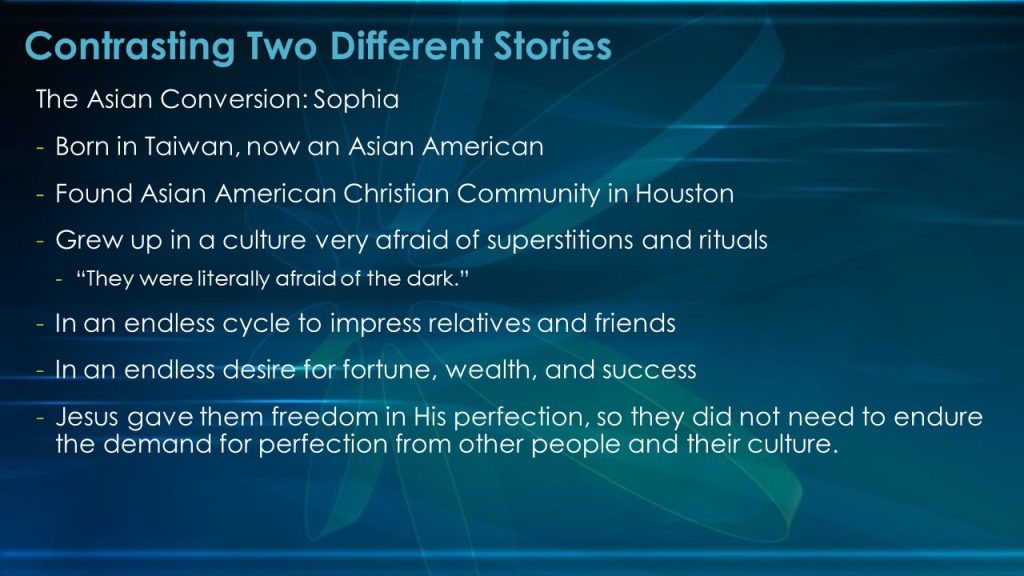
Chan depicts an image of the Asian Conversion. I too have come across people similar to this character Sophia. For Sophia Jesus was a liberating experience, taking her from what she would likely classify as an unhealthy worldview, into something freeing. Jesus = Freedom
In contrast to this Amy Story will be a vastly different outlook.
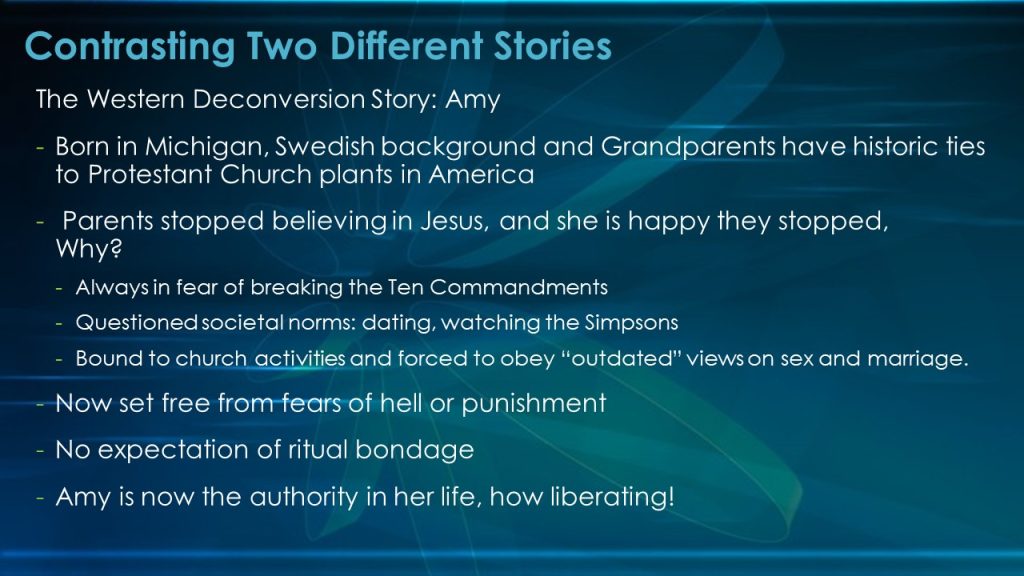
Amy is a caricature of many Western-Caucasian household. Jesus was taught to them by the world to be archaic and repressive. Only by breaking the shackles of history can they be liberated from the bondage of the church.
This is a vastly different perspective to the same faith. This is what someone story can bring to the conversation. Someone’s contextual story strongly influences worldview, including the understanding of the meaning and value of words.
Chan offers us a Western Story Line, a summary of the common traits of the critique of Christian from people in the same camp as Amy. Let’s take a look.
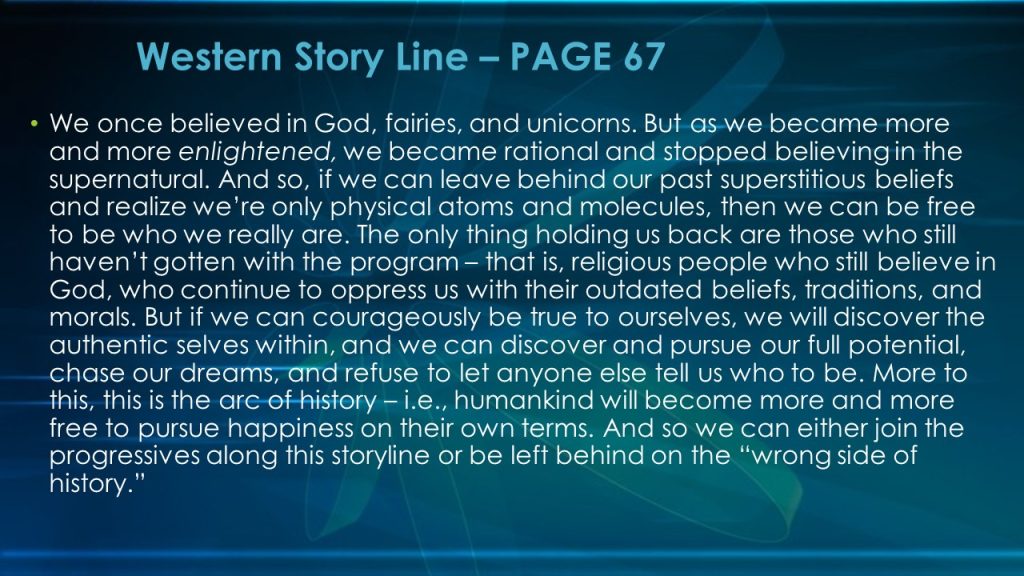
This next slide highlights many of the major worldview statement embedded in this summary.
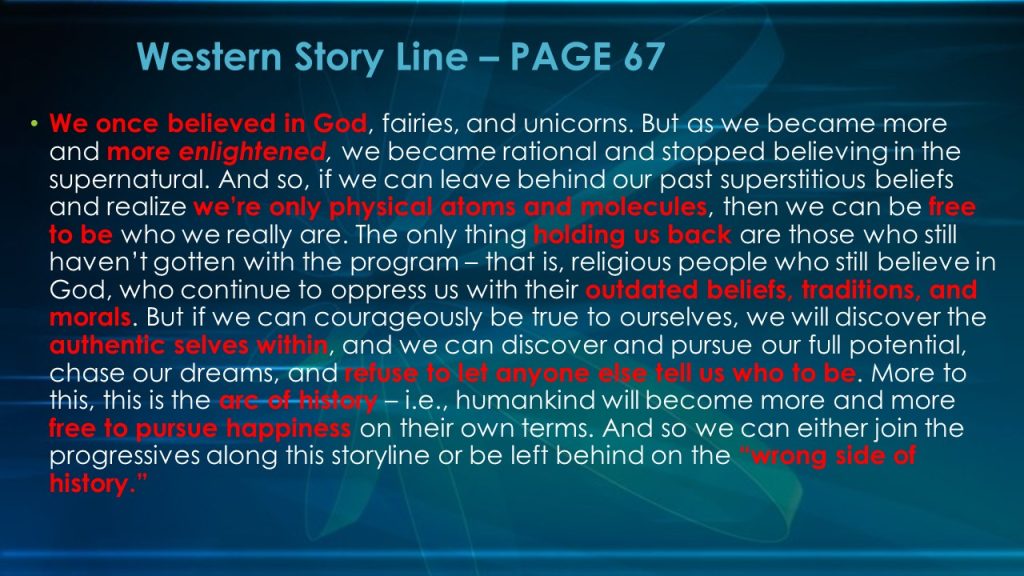
From those statements we can not some of the conclusions or internal rhetoric which might result from this storyline.
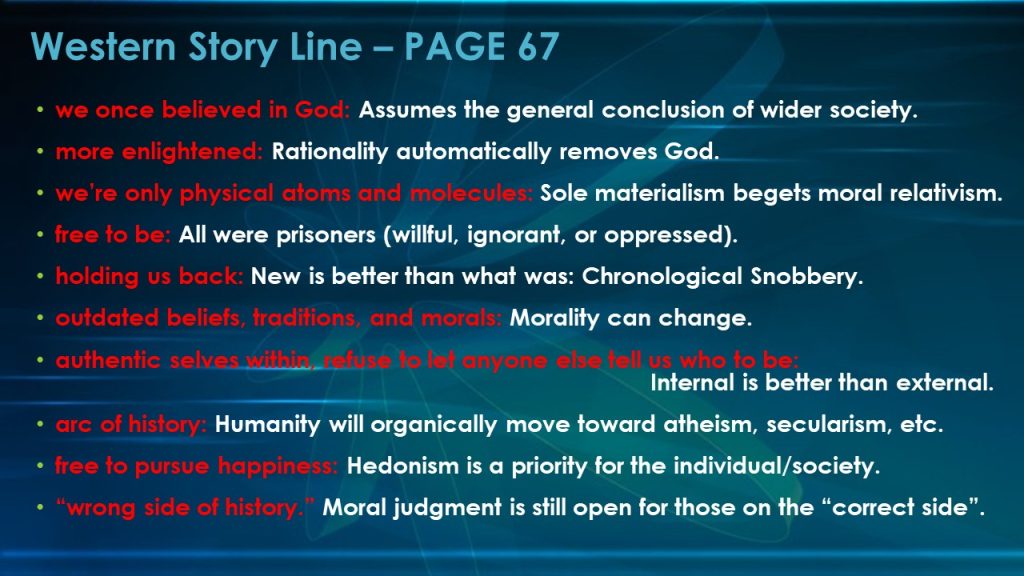
Now not every person will have all of these point bouncing in their head at the time of the conversation, but when you are saturated in one storyline for an extended period of time, the logical continuity which flows from that story will influence how one view and understand other’s stories.
This means that we need to tell our story, and the story of Jesus is a way that won’t get lost in translation between one set of stories, context, world views, values and interest, to another set.
So how do we do this.
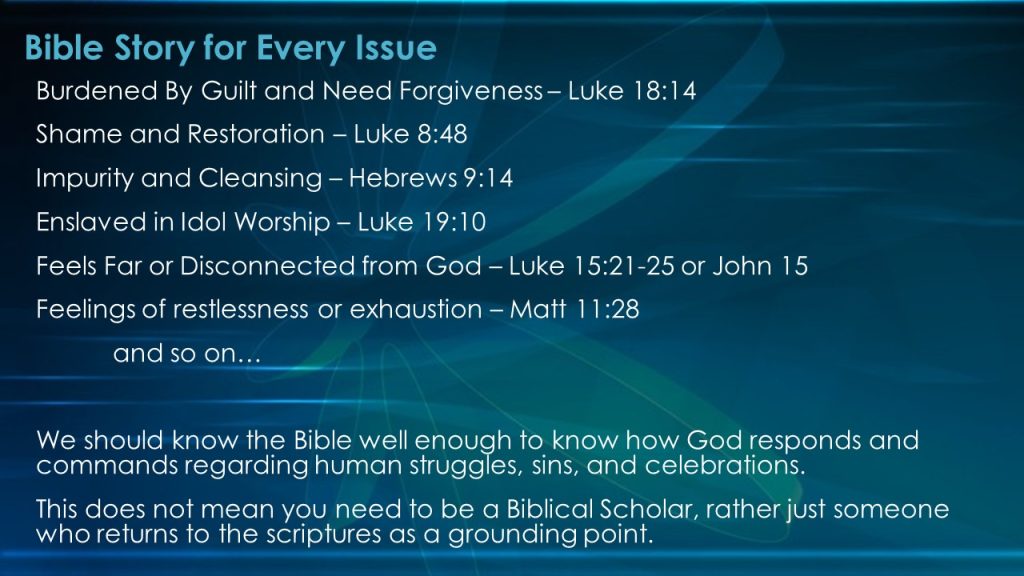
First, we need to equip ourselves with the Scriptures. There are many things in life people, even with massive differences, will find common ground on. Feelings of shame, fear, anxiety, self-worth. And because of this common human experience, we can hear their story and respond with a Biblical story which speaks truth to that common human reality.
This means we have to stay connected to the Scriptures more than just on Sunday morning. Read daily, have a set time for private devotion.
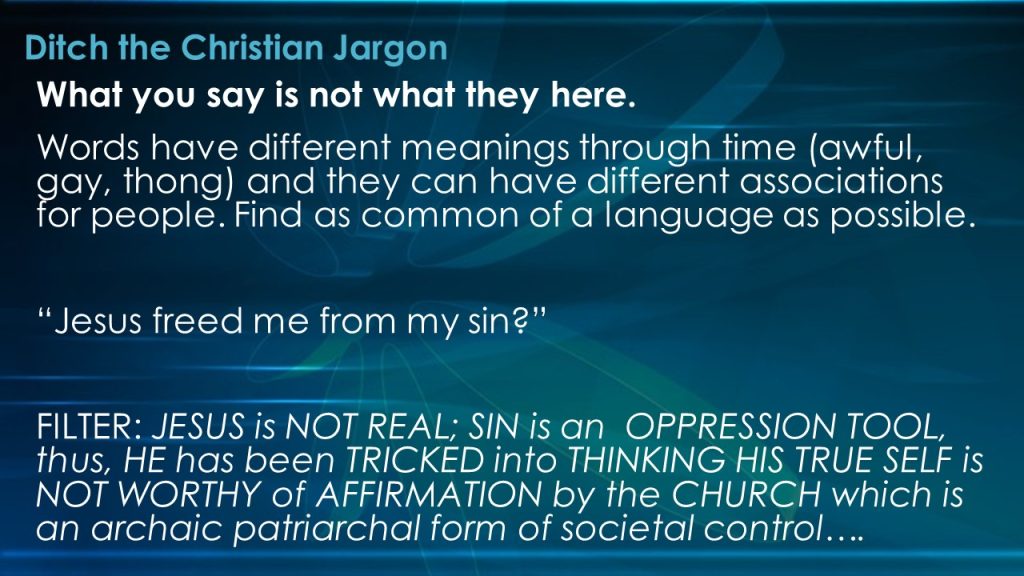
In utilizing your story, and the story in Scripture, avoid using Jargon. Jargon can be hard to place, especially if you have been a Christian your entire life. It is you vernacular to speak that way, but it is not the common vernacular, so drop the Jargon when you can, and realize people might not hear the words you offer in the same way you would. In the slide above you see some Christians might offer “Jesus freed me from my sin!” and the person might hear it through a filter producing something much different then what you intended to say.
You can’t avoid this all together but in your relationship with the person you are witnessing to, if you have been willing to invest into their story by asking questions, and engaging when you didn’t always understand, you give them permission to do the same. Hopefully they will seek clarification.
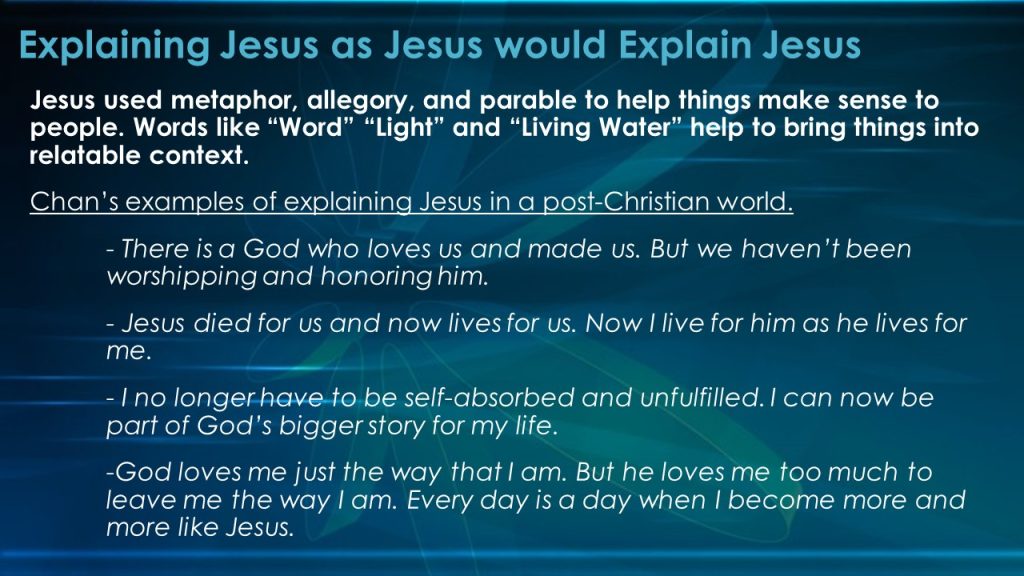
Connect in common ground. Use language which is accessible. Metaphor and allegory help someone get their mind behind a concept. Jesus did this all the time.
But we also need to be able to speak to the Gospel. This can be the hard part, because summarizing the Bible into a short one or two liner, can be a big challenge. I might offer, the Bible is a library of book, but like a love letter written through time which outlines God love for his creation, how he made it, how He has maintains it, and how he fixes it when it breaks. Jesus is the part of the story where God comes into humanity to love us and help us understand his love in fullness. This summary doesn’t asnwer every question but it invites them to come and see.
To help you come up with a summary that works for you Chan suggest having Manger, Cross and King (see below) – elements of Christ/God/Spirit interwoven into what you would offer.
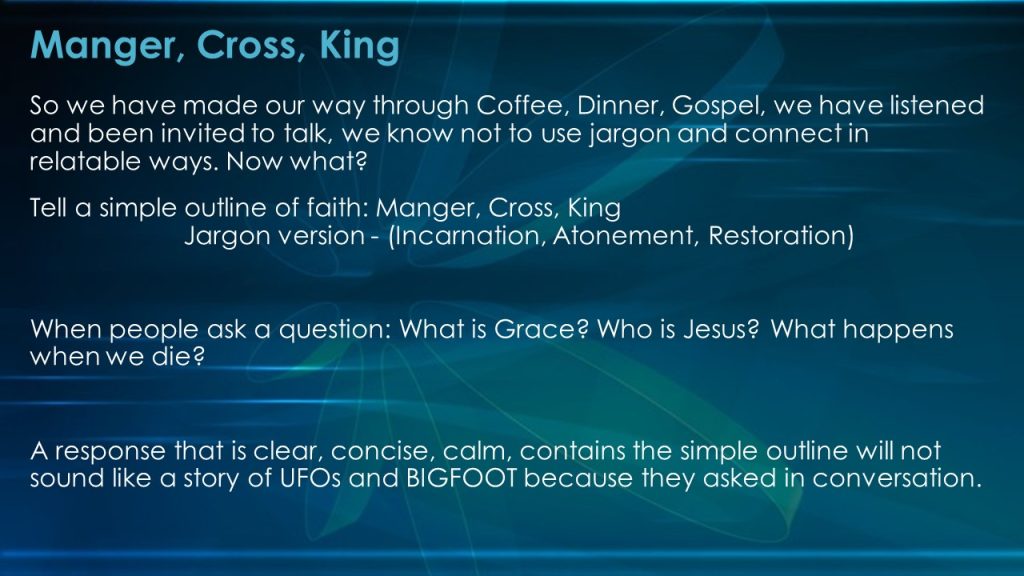
Remember to be calm in your response, do not feel you have to be perfect. If your at this point in the conversation you have been building a foundation to where you can take time, and multiple conversations even, to get the point across.
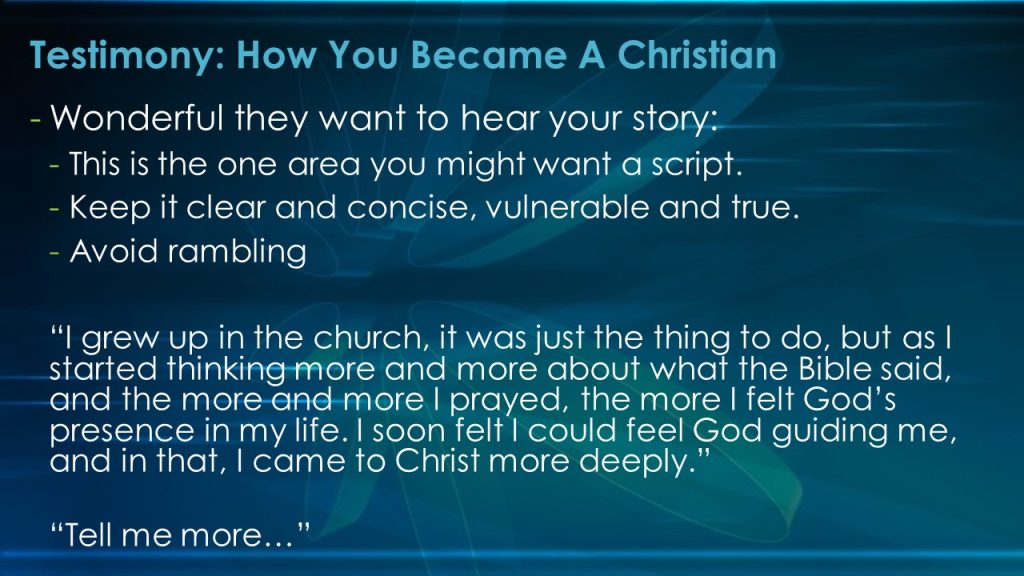
Some people will share a personal testimony about how they came to faith or their faith journey, Chan recommends having a bit of an outline for this to avoid becoming a rambling speaker. When we get into sharing about ourselves we can sometimes get off track and ramble on. For the sake or being calm and clear, try outlining your throughs on your personal journey in faith as a Christian.
A Challenge for the in-person students.
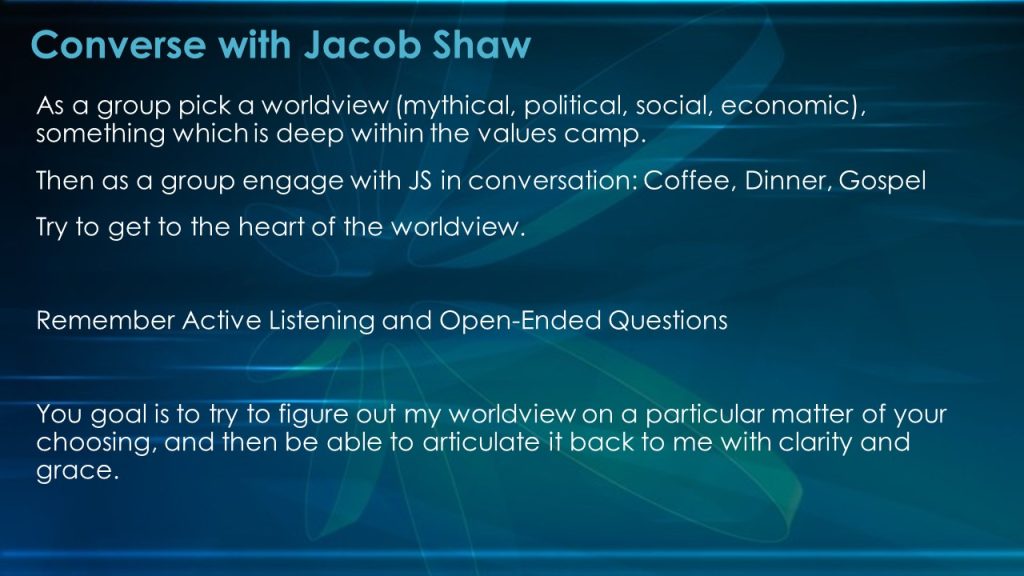
This in-person group will spend some time practicing their listening and questioning skills, they will use their time to try to understand Rev. Jacob more, (that’s me).
For everyone, here are a few common objections about Christianity, to help you explore the Bible. Look at the list below and pick one or two objects to see what Bible stories could help you articulate a response.
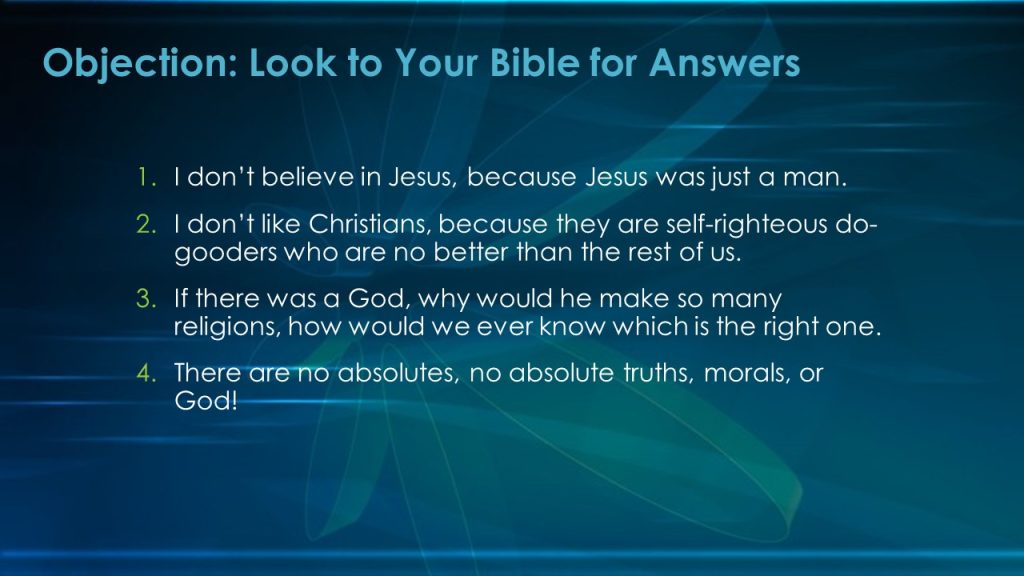
Thank you for joining us online here today to review the lecture material from April 4, for more reflection on Merging your Universes from the themes of Sam Chan’s book, please follow this link –> Here (please note that the reflection found via this link is connected with a past program held by Villages United Church in Granton ON.)
Hope to see you next week either online or in church. GOD BLESS
Leave a Reply